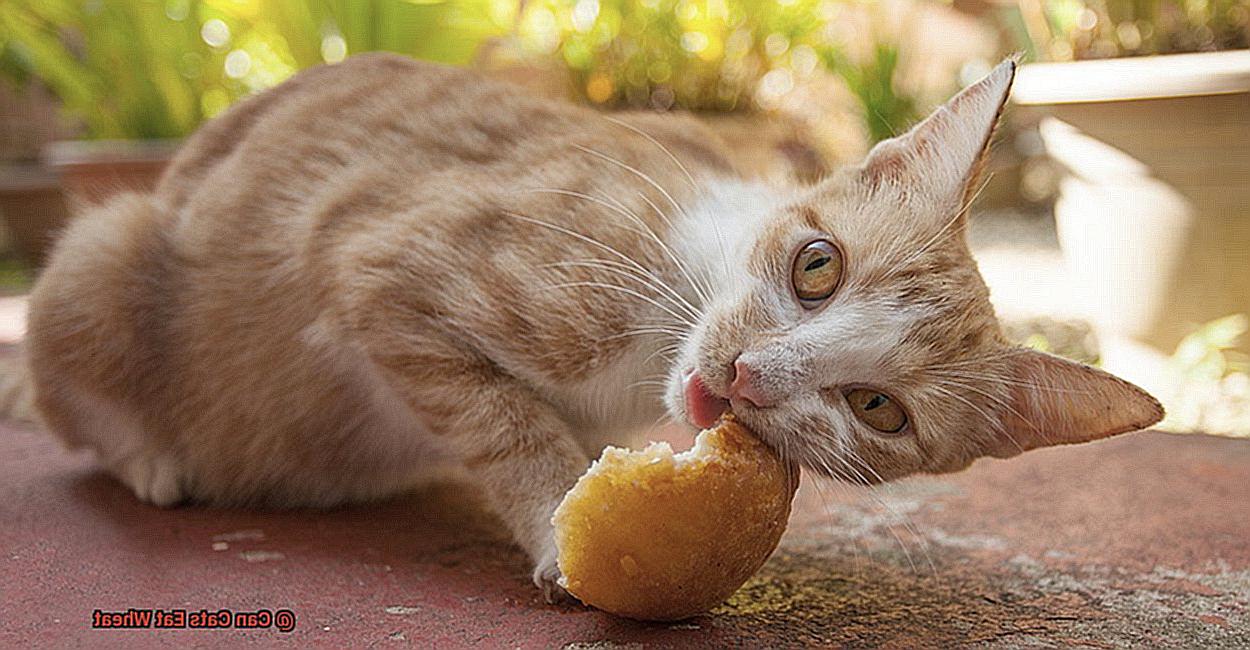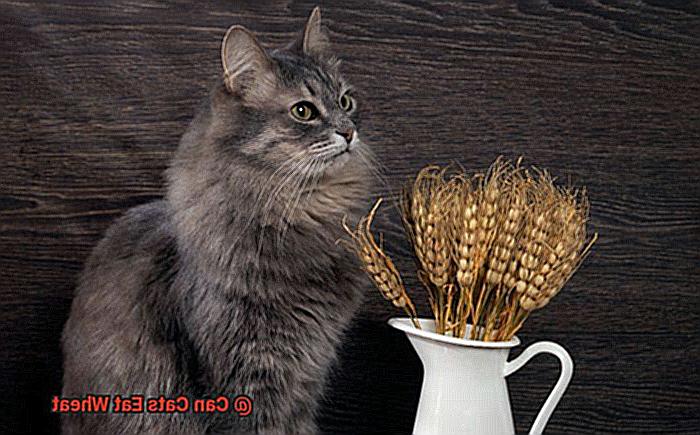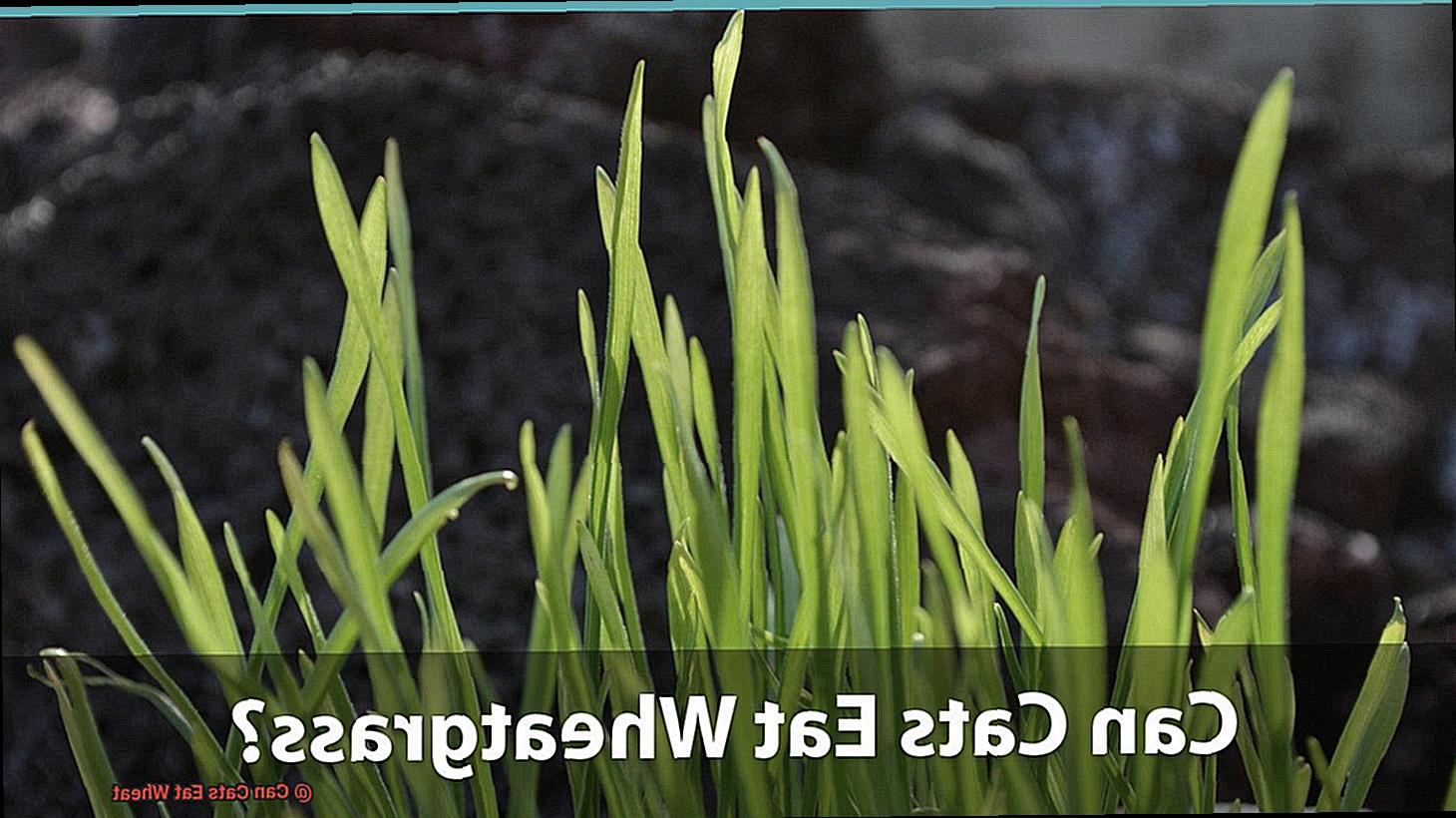Does your furry feline friend have a taste for wheat-based snacks? Are you curious about whether or not it’s safe for cats to indulge in your loaf of bread? As an expert in all things feline, I’m here to help you navigate this question – can cats eat wheat?
While cats are primarily carnivorous creatures, they are known for their playful and curious nature, often leading them to try out new things, including new types of food. However, when it comes to wheat, it’s important to approach with caution.
Although wheat is not toxic to cats, it does not provide the necessary nutritional value that their bodies require.
In fact, if your cat consumes too much wheat, it could lead to digestive problems and allergic reactions. But fear not, there are alternatives to wheat that can provide your feline friend with the proper nutrition.
Throughout this blog post, we’ll dive deep into the topic of can cats eat wheat. We’ll explore the nutritional value of wheat, the potential risks of serving it to your furry friend, and some delicious and nutritious alternatives to satisfy their taste buds. So, let’s buckle up and get ready to learn more about our whiskered companions’ dietary needs!

What is Wheat?
Wheat is the golden child of the grain world. It’s a staple food that’s used to make bread, pasta, and consumed all around the world. It belongs to the grass family and has various types such as soft wheat, hard wheat, durum wheat, and more. Wheat is rich in carbohydrates, fiber, protein, vitamins, and minerals that provide numerous health benefits to humans.
However, for cats, wheat does not offer much nutritional value. Unlike humans or dogs, cats are obligate carnivores. This means that they require a protein-rich diet comprising meat, poultry, and fish to get the right nutrients for their optimal health. Even though a little bit of wheat may not harm your cat, most veterinarians recommend avoiding it altogether.
Wheat is commonly found in human foods like bread, pasta, and cereal. Some pet foods also include wheat. However, uncooked wheat can be harmful to your cat’s digestive system. Additionally, some cats can be allergic to wheat, leading to vomiting, diarrhea, itching, and skin irritations.
To provide your feline friend with a balanced diet, it’s crucial to select a high-quality, grain-free cat food. By choosing a grain-free diet, you can ensure that your cat gets the right nutrients they need to be healthy and happy. You can also offer your cat variety by giving them different sources of protein such as eggs, meat, and fish.
If you’re unsure about what diet to give your cat, it’s best to speak to your veterinarian for advice.
The Cat’s Diet
It means their nutritional needs require meat-based protein sources. Don’t be fooled by their cute and fluffy appearance; cats are not vegans!
In their natural habitat, cats enjoy a diet of small prey like mice and birds. These tiny animals provide them with all the essential vitamins and minerals required to support their health. If you’re keeping an indoor cat, you can replicate this nutrition by providing a diet rich in high-quality animal-based protein. This type of diet gives cats the amino acids necessary for muscle and tissue growth and provides enough energy to let them run and jump around the house.
But wait, what about wheat? Can cats eat it? The answer is yes, but in small quantities. Wheat and other grain-based foods are not a part of a cat’s natural diet. Cat’s bodies are not equipped to process high amounts of starch that can be found in grains like wheat. Additionally, cats lack the necessary enzymes to digest carbohydrates like wheat properly. Consuming wheat can lead to stomach problems, including constipation, diarrhea, and even pancreatitis.
To keep your cat healthy and happy, it’s important to feed them a diet that meets their nutritional requirements without including wheat or other grains. Choosing the right food plays an essential role in your cat’s wellbeing. By giving them a proper diet, you’re setting the stage for a healthy feline life. Don’t hesitate to talk to your veterinarian if you need help choosing the right food for your furry friend.
Risks of Feeding Wheat to Cats
Contrary to popular belief, wheat can be quite detrimental to your furry friend’s health. Not convinced yet? Let’s delve into the potential risks.
The main culprit in wheat is gluten – a protein that cats struggle to digest, leading to diarrhea, vomiting, and other digestive issues. Ingesting an excessive amount of wheat may even cause blockages in your cat’s digestive system, requiring surgery to remove. Trust us, witnessing your beloved pet undergo surgery for something as small as wheat lodged in their stomach is not something you want to experience.

But the troubles don’t end with gluten. Wheat can also be contaminated with harmful bacteria and mold, leading to infections and other health complications. Even worse, some wheat varieties contain toxic chemicals, which can put your feline friend’s life in danger.
Moreover, cats do not fare well with carbohydrates – the primary component of wheat. While a tiny amount of cooked wheat may be alright periodically, a diet high in wheat is not recommended. And let’s not forget, felines have unique dietary requirements that only specialized pet foods can meet.
To sum it up, steer clear of wheat when it comes to your cat’s diet. Opt for specially formulated foods designed to meet your pet’s specific nutritional needs instead. And when in doubt, always consult your veterinarian regarding questionable ingredients.
Symptoms of Wheat Allergy in Cats
Although we are natural carnivores who thrive on a high-protein diet, some cats might develop a reaction to wheat, which can lead to distress and even potentially fatal situations.
Wondering what the symptoms of wheat allergy in cats are? Different cats may show various indications, but some common signs include diarrhea, vomiting, skin irritations or itchiness, scaly skin or open sores, and even hair loss. It’s imperative to detect these symptoms quickly for proper medical intervention.
You may ask yourself, why is recognizing the symptoms of wheat allergy in cats so crucial? The answer is pretty simple. Consuming wheat-containing food can lead to severe complications, ranging from minor gastrointestinal ailments to serious allergic or respiratory reactions, even fatal situations.
If you notice any of the above symptoms in your feline friend, it’s crucial to eliminate wheat-based products from its diet and consult a veterinarian for alternative options that provide balanced and nutritious meals. As you know, cats have different dietary needs, and it’s vital to provide them with the ideal nutrients for a healthy and fulfilling life.
So, being aware of the symptoms of wheat allergy in cats can have a significant impact on our wellbeing.
Harmful Effects of Raw Wheat
Cats are obligate carnivores, meaning their bodies require a high-protein diet originating from meat. As such, wheat is not a natural part of their diet and can cause significant health issues. Consuming raw wheat can lead to an upset stomach, including vomiting, diarrhea, constipation, and a sudden lack of appetite. The reason for this is that wheat contains gluten and complex carbohydrates, which cats cannot break down efficiently.
Gluten, a protein found in wheat, can trigger reactions such as intolerance, allergies, and autoimmune disorders in some cats. In severe cases, this can result in kidney failure or even death.
Moreover, enzymes such as amylase trypsin inhibitors (ATIs) found in wheat are infamous for exacerbating existing inflammatory bowel disease (IBD) in cats, inducing inflammation, pain, and bloating.
One specific enzyme in wheat, alpha-amylase inhibitor-1 (AAI-1), is linked to insulin resistance, weight gain, and diabetes in felines. When cats consume this enzyme, it can lead to various metabolic disorders, creating additional health complications.
So, it’s best to avoid feeding your furry friend uncooked wheat, shaped into any kind of pasta, bread or even crackers. Instead, make sure they have a well-balanced diet that caters to all their nutritional requirements.

Keep an eye out for any gastrointestinal distress symptoms and promptly consult with your veterinarian if your cat happens to consume wheat inadvertently.
Processed Wheat Product
You see, cats have an obligate carnivore diet, meaning they require a protein-rich meal that mainly consists of meat. Complex carbohydrates found in wheat products do not add any nutritional value to your cat’s diet, as it’s difficult for them to digest. Plus, most processed wheat products have additives that only compound the potential health risks.
Feeding your cat wheat could lead to gastrointestinal issues such as diarrhea, constipation, or vomiting. And that’s not all. Wheat is a known allergen, prompting an allergic reaction in some of our feline friends. It can result in severe symptoms such as itching, redness, or even skin irritations.
But there’s more bad news, folks! Many wheat products contain ingredients that can be severely harmful to cats. For example, garlic and onion powder can cause anemia, while high amounts of salt can lead to dehydration and other health issues. Please be sure to study the ingredient labels thoroughly and avoid feeding your cat anything with these ingredients to keep them safe.
So, if wheat-based products should not be your go-to treats for your fur baby, then what can you feed them instead? The answer is obvious – meat and fish! A meat-based diet is crucial for our carnivorous cats as it provides them with essential protein that they need to thrive. But if you do decide to give your cat some wheat, please ensure it’s minimal and keep a watchful eye for possible health issues.
Therefore, processed wheat products should not be recommended for cats as they are difficult to digest and have harmful additives. Sticking to high-quality cat food that is grain-free and has all the necessary nutrients for a cat’s wellness is the best option.

How to Ensure Your Cat’s Nutritional Needs are Met
When it comes to feline nutrition, one thing is clear- cats are true carnivores, and they require a high-quality protein diet that’s rich in meat for optimal health. And if you’re looking for the best way to ensure your cat’s nutritional needs are met, a grain-free diet is the way to go.
It’s no secret that grains such as corn, wheat, and soy are tough to digest, leading to allergies, skin issues, and digestive problems in cats. That’s why it’s crucial to choose high-quality foods that reign supreme in real meat content as the primary ingredient.
But how do you keep your cat interested in their food while ensuring they get all the nutrients they need? By offering a variety of delicious protein sources such as turkey, chicken or fish, your kitty will be pleased and healthy in no time.
Keep in mind that water is just as essential for cats to maintain good health. Make sure to provide them with clean, fresh water always, and multiple water sources at home.
Achieving the right balance of essential nutrients can be tricky, especially with foods packed with fillers that offer zero nutritional value. This is why it’s best to consult with a vet to determine the best diet based on your cat’s age, weight, and health status.
Also, don’t shy away from high-quality, grain-free treats that can boost your kitty’s nutritional intake while making them happy. Keep an eye out for natural ingredients with zero unhealthy preservatives, artificial colors or flavors, or harmful grains.
So, by offering your cats a high-quality, grain-free diet, you’re not just ensuring their wellbeing but also promoting optimal health.
Providing Variety For Cats
It’s no secret that our cats require a diet that’s high in protein to maintain good health. Whether you’re looking to switch things up or supplement your cat’s diet, here are some tasty alternatives that will satisfy even the pickiest of eaters.
Meat
Meat is a top-tier protein source for our kitties, and options like chicken, beef, turkey, and lamb can cater to your cat’s cravings. Just make sure to cook thoroughly, steer clear of bones, and buy meats with no preservatives or hormones.
Fish
Fish is another fantastic source of protein that is loaded with omega-3 fatty acids, which support your cat’s skin and coat. However, remember to cook fish well, take out all the bones, and limit portions as high mercury levels can be harmful.
Eggs
Eggs are small, but they pack a protein punch and provide essential amino acids. Boil or cook your cat’s eggs to minimize the risk of bacterial contamination.
Treat your cat’s taste buds to some veggies like broccoli, peas, mushrooms, and spinach, and you’d be surprised at how much they’ll love it! Although veggies cannot replace meat, they can be a delightful addition to your cat’s diet. Ensure that you cook the veggies beforehand to aid digestion.
Variety is essential, and your cat’s diet shouldn’t revolve around one sole protein source. It’s crucial to rotate these options to provide your cat with all the necessary nutrients they need to be healthy. Plus, rotation ensures that your cat remains engaged in mealtime and keeps optimal health at bay.
Conclusion
In conclusion, the answer to the question “Can cats eat wheat?” is yes, but it’s not recommended.
Even though wheat is not poisonous for cats, it lacks in nutritional value that their bodies require. If your cat eats too much wheat, this could lead to digestive problems and allergic reactions.
As a feline nutrition expert, I suggest avoiding wheat in your cat’s diet and choosing high-quality, grain-free cat food that fulfills their nutritional requirements.
To keep your furry friend’s diet balanced, offer them protein-rich sources such as meats, fish, eggs, and vegetables to add variety.
Remember to always consult with your vet to determine the best diet for your cat. Before giving any treats, check ingredient labels carefully.







